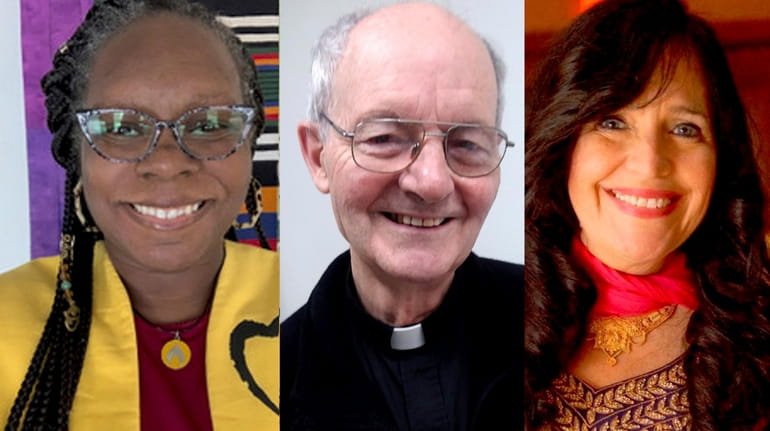Asking the Clergy: How do Kwanzaa principles guide us through challenging times?

From left, the Rev. Kimberly Quinn Johnson of the Unitarian Universalist Congregation of the South Fork, the Rev. William F. Brisotti of Our Lady of the Miraculous Medal Roman Catholic Church, and the Rev. JoAnn Barrett of Gathering of Light Interspiritual Fellowship. Credit: Kimberly Quinn Johnson; Anthony Cacioppo; JoAnn Barrett
Kwanzaa, celebrated annually from Dec. 26 to Jan. 1, is a holiday created in 1966 by Maulana Karenga, a professor of Africana Studies at California State University, Long Beach. This week’s clergy discuss the seven principles reflected upon at Kwanzaa celebrations, which honor the African roots that contribute to the richness of Africa American culture.
The Rev. Kimberly Quinn Johnson
Unitarian Universalist Congregation of the South Fork in Bridgehampton
This year in the face of so much violence, division and uncertainty, Kwanzaa will be especially meaningful.
Not associated with any one religion, Kwanzaa honors seven principles (Nguzo Saba in Swahili): Umoja (unity), Kujichagulia (self-determination), Ujima (collective work and responsibility, Ujamaa (cooperative economics), Nia (purpose), Kuumba (creativity) and Imani (faith). Taken together, they inspire us to forsake the pull of individuality in favor of a more collective outlook.
Last year during Kwanzaa, my congregation met nightly on Zoom to reflect on each principle. Each night, we lit our kinara, Kwanzaa’s seven-branched candleholder, shared songs and readings by Black artists and our thoughts on how that night’s principle can be relevant for our multiracial community.
The question before us: How can we be inspired by each principle to respectfully and meaningfully deepen our relationships with Black communities? While Kwanzaa is rooted in a reclamation and celebration of Black culture, the seven principles offer wisdom and insight for the strengthening and flourishing of all our communities. The principles offer a path to community accountability. With a forward-looking orientation, they remind us of the importance of cultivating our connection to ancestors, family and community as we build toward our future.
The Rev. JoAnn Barrett
Senior officiant, Gathering of Light Interspiritual Fellowship, Huntington Station
Our community focuses on the spiritual nature of events that are taking place around us, so we can tap into the positive influence that these sacred holidays promote. Kwanzaa is such a holiday.
Kwanzaa is not religious but spiritual in nature. It calls to a community of people to go within and bring forth the universal principles of unity, self-determination, collective work and responsibility, cooperative economics, purpose, creativity and faith. These principles are so important to an individual’s growth that our community celebrates Kwanzaa every year at our December HolyDays Party. Some years we also devote a full service to it.
Our diverse community includes seekers who wish to explore the best of humanity to discover the best in themselves. Kwanzaa provides an excellent lesson in spiritual principles that foster healing. It has been my experience that loneliness and feeling isolated have been prominent factors in stress levels for individuals. Knowing you belong and are wanted lifts a tremendous burden off the soul. We are all our brother’s keepers.
Kwanzaa is a powerful celebration of healing that teaches that each of us can play an active role in the betterment of our world.
The Rev. William F. Brisotti
Pastor emeritus, Our Lady of the Miraculous Medal Roman Catholic Church, Wyandanch
Kwanzaa is a secular holiday, born of the experiences of people of African ancestry in the U.S.A., but with a message of interconnectedness with everyone and the personal responsibility of each person for the whole of society. It is an annual "rebooting" and reconnection with purpose, which we all need in these challenging and dangerously divisive times.
Kwanzaa teaches the dignity of every human person, with its seven principles celebrating family, community and culture. These principles can help us appreciate our own and others’ families, communities and cultures. Thus, Kwanzaa promotes true human individuality, mutuality and solidarity, all of which are so much needed to understand the history and development of the profound problems facing virtually every nation today, as well as how to resolve them collaboratively and at the same time to promote a deeper awareness of our global human family.
Kwanzaa’s principles can facilitate sharing of vision, discovery of common interest and coordinated problem-solving, countering so much hurtful friction among our current, unnecessarily polarized camps, in favor of the national, international and global common good.
DO YOU HAVE QUESTIONS you’d like Newsday to ask the clergy? Email them to LILife@newsday.com.
Updated 48 minutes ago Teacher pay ... Trump in court today ... Santos' request to unseal witness statements ... Autism walk
